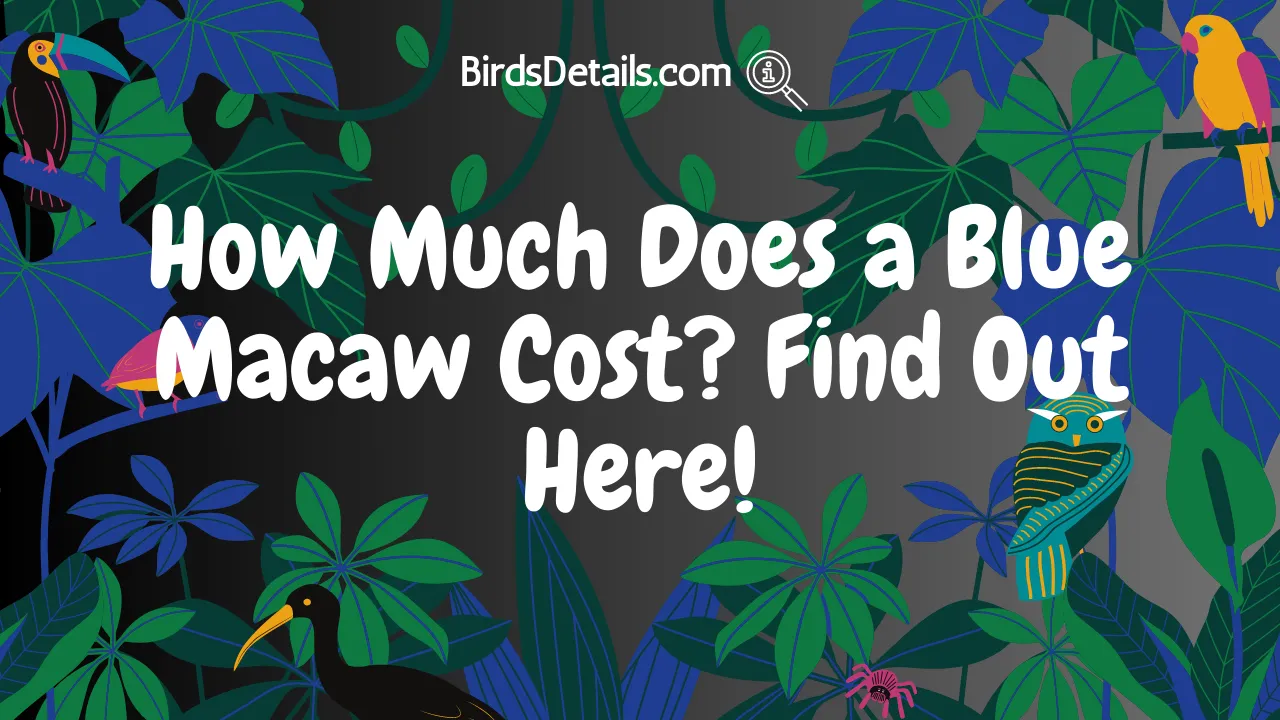A blue macaw typically costs around $1,500 to $2,500. Blue macaws are popular due to their vibrant coloration and engaging personalities.
| Factor | Cost |
|---|---|
| Bird alone | $700 – $2500 |
| Cage | $500 – $1500 |
| Food | $50 – $100 per month |
| Toys | $20 – $50 per month |
| Vet care | $100 – $200 per year |
| Other expenses | $50 – $100 per month |
These exotic birds are known for their striking blue feathers, which make them highly sought after among bird enthusiasts. Blue macaws also have a friendly and sociable nature, making them great companions. However, it is important to consider the costs associated with owning a blue macaw, such as their specialized diet and habitat requirements.
Additionally, potential owners should also be aware of the time and effort required to properly care for and bond with a blue macaw. Overall, while the price of a blue macaw may be significant, the joy and companionship they provide can make them a worthwhile investment for bird lovers.
Understanding The Popularity And Rarity Of The Blue Macaw
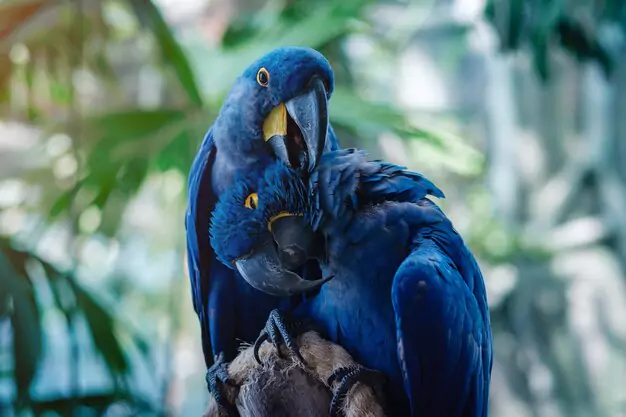
Discover the intriguing allure of the blue macaw, a majestic bird known for its vibrant blue feathers and exceptional rarity. Uncover the true worth of this exquisite creature and explore the fascinating world of blue macaw ownership.
The blue macaw’s vibrant coloring and unique characteristics:
The blue macaw is renowned for its stunning vibrant blue feathers, which set it apart from other bird species. Its bright colors are not only visually striking but also serve several purposes in its natural habitat. Here are some key characteristics that make the blue macaw unique:
- Adaptation to the environment: The blue macaw’s vibrant plumage helps it blend into the lush rainforest surroundings, affording it a certain level of camouflage and protection from predators.
- Feeding habits: With a strong beak capable of cracking nuts and seeds, the blue macaw is well-equipped for its preferred diet. Its beak also allows it to reach fruits that other birds may struggle to access, making it an important seed disperser for many tree species.
- Sociability and intelligence: Blue macaws are highly social birds, forming close bonds with their mates and demonstrating a remarkable level of intelligence. These characteristics contribute to their ability to communicate, problem-solve, and even mimic human speech.
Conservation efforts and decreasing population numbers:
The blue macaw, specifically the spix’s macaw (cyanopsitta spixii), faces significant threats that have led to a decline in its population. Here are some important points about the conservation efforts and decreasing numbers:
- Habitat loss: Destruction of the Amazon rainforest, primarily due to deforestation for agriculture, has resulted in the loss of crucial nesting and foraging sites for the blue macaw. This destruction, coupled with the extraction of natural resources, has fragmented their habitat.
- Illegal pet trade: The blue macaw’s vibrant plumage and unique characteristics make it a highly sought-after species in the illegal pet trade. This has further contributed to the decline of its population, as it is often captured from the wild and sold in black markets.
- Conservation initiatives: Various organizations and governments have initiated projects to protect and conserve the blue macaw. These efforts include habitat restoration, captive breeding programs, and law enforcement to combat the illegal pet trade.
- Population status: Despite conservation efforts, the blue macaw remains critically endangered. The spix’s macaw, in particular, is considered extinct in the wild, with only a few individuals remaining in captivity. Efforts are being made to reintroduce individuals back into their natural habitat.
It is crucial to raise awareness about the blue macaw’s popularity, rarity, and the challenges it faces to ensure its long-term survival. Through conservation efforts, we can help protect this magnificent bird and preserve its place in the natural world.
Rareness And Availability Of Blue Macaws In The Market
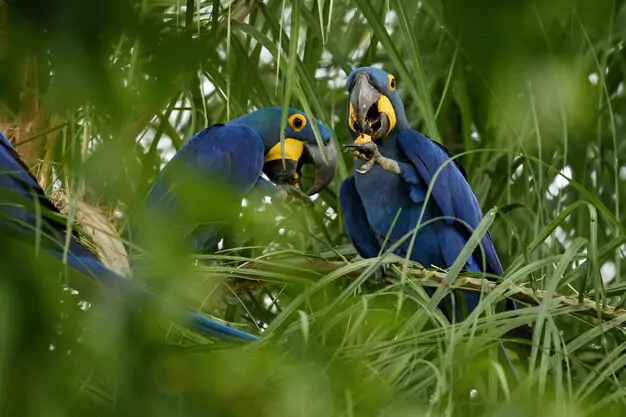
Blue macaws are highly sought after due to their rarity, making them a prized addition to the market. However, their availability is limited, leading to high prices and a competitive market for these unique and stunning birds.
The magnificent blue macaw, with its vibrant blue plumage and captivating personality, has become a highly sought-after companion for bird enthusiasts. However, the availability of these majestic creatures remains limited due to various factors. Let’s delve into the rareness and the challenges surrounding their acquisition in the market.
Limited Number Of Breeders And Availability
- The scarcity of blue macaws in the market can be attributed to the limited number of breeders specializing in their reproduction.
- Breeders with expertise in macaw breeding are highly skilled and dedicate considerable time and resources to ensure the welfare and health of these birds.
- Due to the complex nature of breeding blue macaws, it is not a widespread practice among aviculturists. Hence, the number of breeders is relatively low.
Import And Export Restrictions
- Import and export regulations play a significant role in the availability of blue macaws in the market.
- These majestic birds are native to specific regions such as South America, particularly Brazil, making it challenging to obtain them legally from their natural habitat.
- Governments and conservation organizations impose strict regulations to prevent the illegal capture and trade of blue macaws, as they are critically endangered species.
- Compliance with these regulations involves extensive paperwork, permits, and adherence to stringent guidelines, further adding to the limited availability of blue macaws.
To ensure the preservation and well-being of blue macaws, it is crucial to prioritize their conservation and promote responsible breeding practices. As demand for these rare birds continues to rise, potential owners need to seek reputable breeders who prioritize the welfare and conservation of these magnificent creatures.
By understanding the rarity and availability challenges associated with blue macaws, enthusiasts can make informed decisions when searching for their feathered companions, helping protect and preserve these remarkable species for generations to come.
Quality And Health Of The Blue Macaw

The blue macaw is a rare and vibrant bird known for its high quality and good health. If you’re wondering how much a blue macaw costs, it can range from several thousand to tens of thousands of dollars, depending on factors such as age, breed, and rarity.
But investing in the well-being of these magnificent birds is always worth it for their beauty and companionship.
Blue macaws are majestic and vibrant birds that captivate the hearts of many bird enthusiasts. When considering adopting or purchasing a blue macaw, it is crucial to prioritize the quality and health of the bird. Here, we will explore the importance of good breeding practices and the significance of health certifications and vet check-ups.
By understanding these factors, you can ensure the well-being and happiness of your beloved blue macaw.
Importance Of Good Breeding Practices
Breeding plays a pivotal role in the overall quality and health of blue macaws. Responsible breeders prioritize the well-being of the birds and ensure that they are bred ethically and in a controlled environment. The following factors highlight the importance of good breeding practices:
- Genetic strength: Well-bred blue macaws exhibit stronger genetic traits, making them less prone to health issues.
- Temperament: Through careful breeding, reputable breeders can produce blue macaws with desirable temperaments, ensuring a better bond between you and your bird.
- Physical attributes: Ethical breeding practices aim to enhance the physical beauty and appearance of blue macaws, resulting in birds with vibrant plumage and striking features.
Health Certifications And Vet Check-Ups
Maintaining the health of your blue macaw is paramount. Ensuring that your bird undergoes regular vet check-ups and possesses relevant health certifications is essential. Below are the reasons why health certifications and vet check-ups are vital:
- Early detection of health issues: Regular vet check-ups enable early identification and treatment of any underlying health problems, preventing potential complications.
- Preventative care: By visiting a vet, you can receive valuable guidance regarding nutrition, vaccinations, and other preventative measures, promoting the overall well-being of your blue macaw.
- Peace of mind: Health certifications provide reassurance that the bird you are investing in has been thoroughly examined, guaranteeing that you are acquiring a healthy and well-cared-for blue macaw.
Remember, a blue macaw with good breeding and proper health care has a higher likelihood of leading a happy and fulfilling life. Being knowledgeable about these aspects allows you to make well-informed decisions and provide the best care for your feathered friend.
Age And Gender Of The Blue Macaw
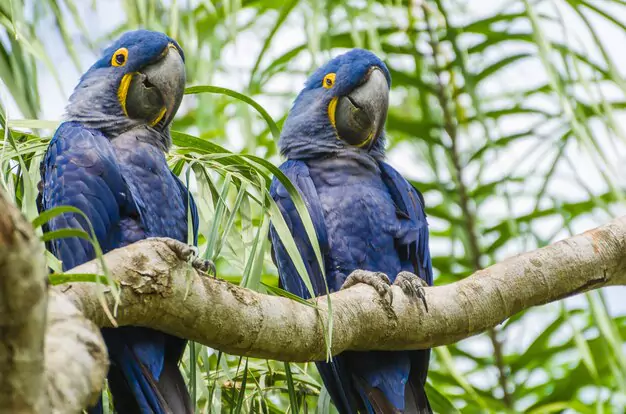
The cost of a blue macaw varies depending on the age and gender of the bird. The price can range from a few hundred dollars to several thousand dollars.
When it comes to pricing a blue macaw parrot, several factors come into play. One of the most significant factors is the age and gender of the bird. Let’s dive into the differences in pricing based on these factors.
Differences In Pricing Based On Age And Gender:
- Age: The age of the blue macaw can have a substantial impact on its price. Typically, younger birds are more expensive than older ones due to their longer lifespan and potential for longer companionship. Additionally, younger birds can be trained more easily and adapt better to new environments.
- Gender: Another factor that affects the price of a blue macaw is its gender. Male and female blue macaws generally have similar prices, with only slight variations. However, some breeders or sellers may charge differently based on the bird’s gender, usually due to breeding considerations.
- Reproductive capabilities: Pricing may also be influenced by the reproductive capabilities of the blue macaw. Breeding pairs are often more expensive than individual birds because they have the potential to produce offspring. Breeding pairs are sought after by breeders and those interested in contributing to conservation efforts.
- Availability: The availability of younger blue macaws, especially chicks, can affect their pricing. Scarcity or high demand for specific age groups (e.g., baby birds) can drive up the price. It’s essential to consider factors such as seasonality and breeder availability when looking for a blue macaw.
- Color mutations: Blue macaws with unique color mutations, such as albinism or rare plumage variations, may also command higher prices. These unique characteristics make these birds incredibly sought after by collectors and enthusiasts.
When determining the price of a blue macaw parrot, factors such as age, gender, reproductive capabilities, availability, and color mutations all play a role. Exploring different options and understanding these factors can help you make an informed decision when purchasing a blue macaw.
Color Variation And Genetic Mutations
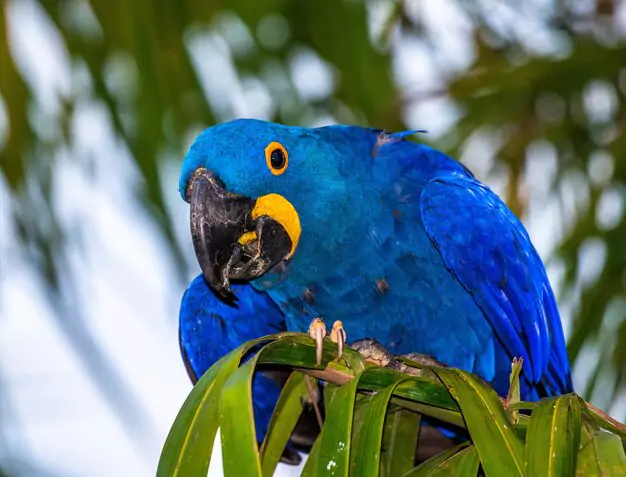
The price of a blue macaw can vary depending on factors such as age, availability, and the breeder’s reputation. Due to genetic mutations, the rarity of blue-colored macaws can increase their price even further. However, obtaining an accurate price range for a blue macaw is important and can be determined by researching reputable breeders or bird sellers.
Blue macaws are stunning birds known for their vibrant colors and captivating appearances. However, not all blue macaws are the same. These magnificent creatures exhibit various color variations and genetic mutations, making each unique in its way. In this section, we will explore the rarity and demand for specific color variations as well as the pricing for specialized genetic mutations in blue macaws.
Rarity And Demand For Specific Color Variations:
- Blue macaws with rare color variations are highly sought after by bird enthusiasts and collectors worldwide.
- The rarity of these color variations often drives up demand and subsequently impacts the price.
- Here are some examples of the most sought-after color variations in blue macaws along with their distinguishing traits:
- Cobalt blue variation: This variation showcases a vibrant deep blue coloration, making the bird appear even more striking.
- Turquoise variation: Characterized by a beautiful mix of blue and green shades, this color variation adds a touch of uniqueness to the bird’s appearance.
- Violet variation: Birds with this color variation exhibit stunning violet hues, captivating anyone who lays eyes on them.
- Opaline variation: Known for its pastel-like colors, the opaline variation presents a softer and more delicate appearance.
Pricing For Specialized Genetic Mutations:
- When it comes to specialized genetic mutations in blue macaws, the pricing can vary significantly depending on rarity, demand, and the specific mutation itself.
- Some uncommon genetic mutations, such as those affecting feather patterns or eye color, can significantly increase the value of a blue macaw.
- Here are a few examples of specialized genetic mutations and their impact on pricing:
- Pied mutation: Birds with this mutation display patches of different colors on their feathers, creating a visually striking effect. This genetic variation often commands a higher price.
- Albino mutation: Albino blue macaws lack pigmentation in their feathers, resulting in a mesmerizing all-white appearance. Due to their rarity, albino blue macaws are often priced much higher than their counterparts.
- Lutino mutation: This genetic variation causes the bird’s feathers to have a yellow or orange coloration. The unique appearance of lutino blue macaws makes them highly sought after by collectors, leading to a higher price tag.
Blue macaws with distinct color variations and genetic mutations are prized for their individuality and beauty. The rarity and demand for these variations contribute to their overall pricing, creating a fascinating market for these extraordinary birds.
Reputable Avian Breeders And Specialty Pet Stores
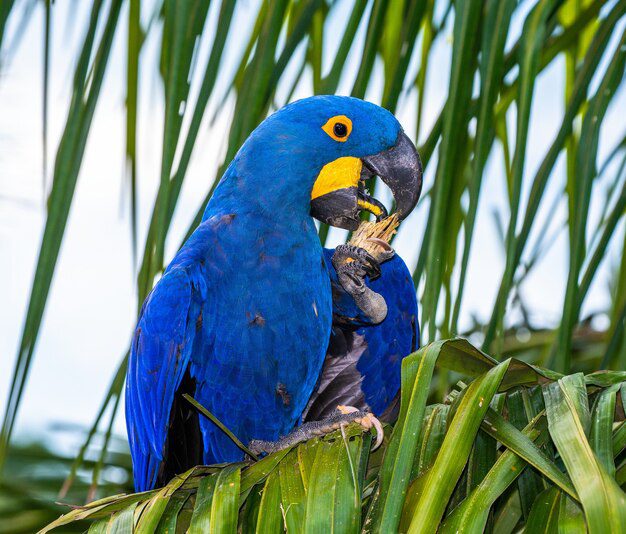
Discover reputable avian breeders and specialty pet stores that offer stunning blue macaws at competitive prices. Get the perfect companion at the right cost and embark on an exciting journey with these magnificent birds.
Researching And Choosing Trustworthy Breeders
To ensure you are buying a blue macaw from a reputable source, it is important to do thorough research and choose a trustworthy avian breeder or specialty pet store. Here are some guidelines to help you make an informed decision:
- Seek recommendations: Ask for referrals from experienced bird owners, avian veterinarians, or reputable bird enthusiast groups. Personal recommendations can provide valuable insights into trustworthy breeders.
- Check breeder credentials: Look for breeders who have the necessary permits and licenses to breed and sell birds. They should abide by local laws and regulations and demonstrate their commitment to ethical breeding practices.
- Visit the facility: Schedule a visit to the breeder’s facility or the specialty pet store where the blue macaws are available. Observe the conditions in which the birds are kept. Clean and spacious areas with proper ventilation are indicative of a reputable breeder.
- Meet the breeder: Interact with the breeder and ask detailed questions about their breeding practices, the care they provide to the birds, and their experience in breeding blue macaws. A knowledgeable and passionate breeder will be happy to share information and address any concerns you may have.
- Request health guarantees: Reputable breeders will provide health guarantees for the birds they sell. Ensure that they conduct regular veterinary check-ups and provide proper vaccinations and nutrition to their birds.
- Ask for references: Request references from previous customers who have purchased blue macaws from the breeder or specialty pet store. Reach out to them to learn about their experience and satisfaction with the bird’s health and temperament.
Red Flags To Watch Out For When Selecting A Seller
While researching and choosing a seller for a blue macaw, it is crucial to be aware of potential red flags that may indicate an unreliable or unethical seller. Here are some warning signs to watch out for:
- High-pressure sales tactics: Beware of sellers who use aggressive sales tactics to push you into making a quick decision. A reputable seller will allow you time to research and make an informed choice.
- Lack of transparency: If a breeder or seller is hesitant to provide detailed information about their breeding practices, bird health records, or references, it could be a sign that they have something to hide.
- Unhealthy or mistreated birds: Pay attention to the appearance and behavior of the birds at the seller’s facility. Signs of malnutrition, poor hygiene, or birds kept in overcrowded or unsanitary conditions should raise concerns about the seller’s ethical standards.
- No health guarantees: A seller who does not offer any health guarantees or refuses to provide a documented history of the bird’s veterinary care may not prioritize the well-being of their birds.
- Suspicious pricing: Be cautious of prices that are significantly lower than average market rates for blue macaws. Unusually low prices may indicate improper breeding practices or poor bird welfare.
- Lack of proper documentation: Ensure that the seller can provide the necessary paperwork, including the bird’s ownership transfer documents, health records, and legal permits. Lack of proper documentation may indicate an illegal or untrustworthy seller.
By researching and choosing a trustworthy breeder or specialty pet store, you can make sure you are bringing home a healthy and ethically bred blue macaw. It is important to be vigilant and consider these red flags to avoid potential scams or purchasing a bird that may have health or welfare issues.
Online Marketplaces And Auctions
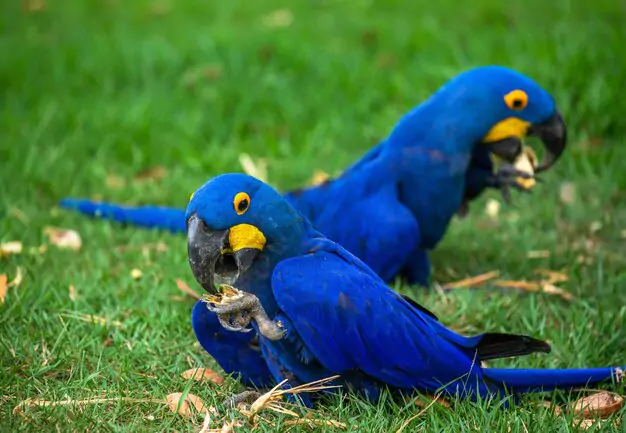
Looking for the price of a blue macaw? Explore online marketplaces and auctions to find the best deals on these beautiful exotic birds.
Online marketplaces and auctions have become popular platforms for buying a blue macaw. However, it’s important to consider the pros and cons before making a purchase. So, let’s dive into the world of online shopping for blue macaws:
Pros And Cons Of Buying A Blue Macaw Online:
- Wide selection: Online marketplaces and auctions offer a vast range of blue macaws for sale, giving you more options to choose from. You can browse through different sellers and compare prices, colors, and ages of the birds before making a decision.
- Convenience: Buying a blue macaw online saves you the hassle of physically visiting multiple pet stores or breeders. You can conveniently search, inquire about the birds, and make a purchase from the comfort of your own home.
- Price comparison: Online platforms allow you to easily compare prices from different sellers, helping you find the best deal for your budget. This enables you to make an informed decision and potentially save money on your blue macaw purchase.
- Verified sellers: Reputed online marketplaces and auction sites often have seller ratings and reviews. This allows you to assess the credibility and trustworthiness of the sellers before proceeding with a purchase.
- Convenience of information: Online platforms provide detailed information about the blue macaw’s health, age, vaccination history, and other essential details. This allows you to make an informed decision based on the provided information.
- Wider reach: Online marketplaces can connect you with sellers from various locations, increasing your chances of finding the specific blue macaw you desire. This broadens your choices and gives you access to birds that may not be available locally.
- Safe shipping and delivery: Reputable online sellers prioritize the well-being of the birds during shipping and delivery. They ensure appropriate packaging and transportation methods to minimize stress and ensure the bird’s safety throughout the journey.
- Potential risks: Despite the advantages, there are some potential risks involved in buying a blue macaw online. These include the possibility of scams or misrepresentation of the bird’s health, behavior, or age. It’s crucial to thoroughly research and verify the credibility of the seller before making a purchase.
Buying a blue macaw online can be a convenient and exciting experience, offering you a wide selection and potential savings. However, it’s essential to exercise caution, thoroughly research sellers, and ensure safe shipping and delivery to make your online purchase a positive one.
Adoption And Rescue Centers
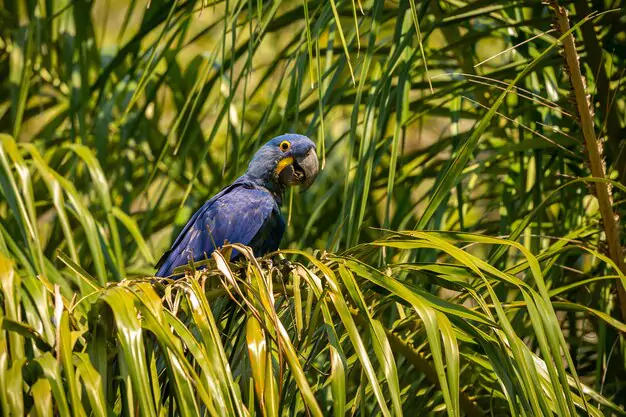
Adoption and rescue centers offer blue macaws at various prices depending on factors such as age and condition, with the range typically starting from a few hundred dollars. By adopting a blue macaw from a rescue center, you not only find a new feathered friend but also contribute to the important work these centers do in caring for and finding homes for these beautiful birds.
Blue macaws are captivating and beautiful birds that have become popular among bird enthusiasts. The stunning colors and unique features of these birds make them highly sought after. If you’re considering bringing a blue macaw into your home, you may be wondering about the adoption and rescue options available.
In this section, we’ll explore the considerations for adopting a blue macaw and the costs involved in rescuing one.
Considerations For Adopting A Blue Macaw:
- Compatibility: Before adopting a blue macaw, it’s essential to assess whether these birds are suitable for your lifestyle. They are highly intelligent and social creatures that require a significant amount of attention and mental stimulation. Consider your ability to provide a stimulating environment and dedicate time to their care.
- Experience with birds: If you have never owned a blue macaw or any other bird before, it’s vital to educate yourself about their specific needs and requirements. These birds can live for several decades, so having prior experience with avian care is highly beneficial.
- Housing and space: Blue macaws need spacious and secure enclosures where they can move freely and exercise. Ensure that you have an appropriate living space with enough room for their wingspan and a safe environment to prevent any accidents or escapes.
- Commitment: Adopting a blue macaw is a long-term commitment. These birds form strong bonds with their owners and thrive on consistency and routine. Consider your ability to provide proper care, time, and attention for the duration of your lives.
- Preparation for costs: Owning a blue macaw can be expensive. From purchasing a suitable enclosure to providing a nutritious diet and regular vet check-ups, be prepared for ongoing expenses associated with their well-being.
Costs Involved In Rescuing A Blue Macaw:
- Adoption fee: Rescue centers typically charge an adoption fee to help cover the costs of caring for the birds. The adoption fee varies depending on the rescue center and may include initial vet check-ups, microchipping, and other necessary expenses.
- Veterinary expenses: Upon adopting a blue macaw, it’s essential to schedule a thorough veterinary examination to ensure their health and well-being. This examination may include blood work, parasite testing, and any necessary vaccinations or treatments. These initial veterinary expenses can add up, so it’s essential to budget for these costs.
- Food and nutrition: Providing a balanced and nutritious diet is crucial for the overall health of your blue macaw. The ongoing cost of premium-quality bird food, fresh fruits, and vegetables should be considered in your budget.
- Enrichment and toys: Blue macaws are intelligent birds that require mental stimulation. Investing in a variety of toys, puzzles, and challenging activities will help prevent boredom and promote a happier and healthier bird. The cost of toys and enrichment items should be factored into your budget.
- Routine care: Regular grooming, maintenance, and routine veterinary care are necessary for the well-being of your blue macaw. These expenses include nail trims, feather trimming (if required), and annual veterinary check-ups.
Remember, adopting a blue macaw is not just about the initial cost but also the ongoing commitment and responsibility of providing a safe and loving home. By considering these factors and being prepared for the associated costs, you can make an informed decision when adopting a blue macaw and providing it with the forever home it deserves.
Initial Purchase Price Of A Blue Macaw
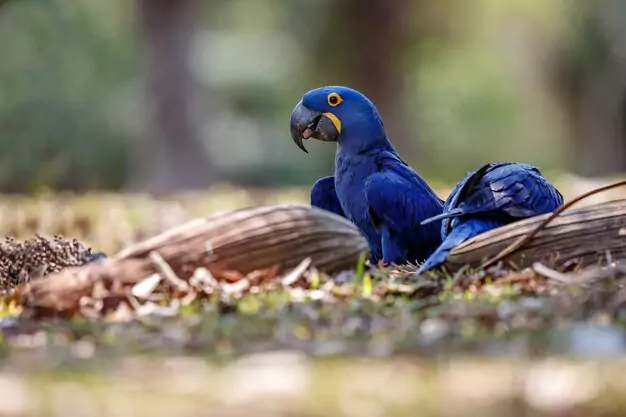
Blue macaws are known for their vibrant colors and unique appearance. When it comes to their initial purchase price, it can vary depending on factors such as age and whether they are bred or wild-caught. However, on average, you can expect to pay around $2,000 to $5,000 for a blue macaw.
Factors That Determine The Base Price
Blue macaws are beautiful and exotic birds that many people dream of owning. However, before bringing a blue macaw home, it’s essential to consider the factors that determine their base price. These factors include:
- Age: The age of the blue macaw can impact its initial purchase price. Younger birds tend to be more expensive than older ones.
- Availability: The demand for blue macaws can affect their price. If there are limited numbers available in the market, the cost may be higher.
- Breeder reputation: The reputation of the breeder plays a significant role in pricing. Reputable breeders who offer well-bred, healthy blue macaws often charge a premium.
- Color mutations: Blue macaws with unique color mutations may have a higher price tag due to their rarity and desirability.
- Health and genetics: Birds with good health and desirable genetics may command a higher price as they are likely to live longer and have fewer health issues.
Comparing Prices From Different Sources
When considering purchasing a blue macaw, it’s crucial to compare prices from different sources to ensure you are getting the best deal. Here are a few points to consider while comparing prices:
- Pet stores: Local pet stores may offer blue macaws, but their prices can vary. Compare the prices at different stores and check if they include any additional benefits like health warranties or accessories.
- Breeders: Reputable breeders often sell blue macaws directly. Research multiple breeders and compare their prices, ensuring they have a good reputation and provide proper care for their birds.
- Rescue centers: Some blue macaws may be available for adoption or purchase from rescue centers. Check these centers for any available birds and compare their prices to other sources.
Remember that while price is a crucial factor, it’s equally important to consider the bird’s health, living conditions, and overall reputation of the source.
By evaluating the factors that determine the base price and comparing prices from different sources, you can make an informed decision when purchasing a blue macaw. Create a comfortable habitat, build a strong bond with your feathered companion, and ensure their well-being for years to come.
Additional Expenses And Upkeep Costs
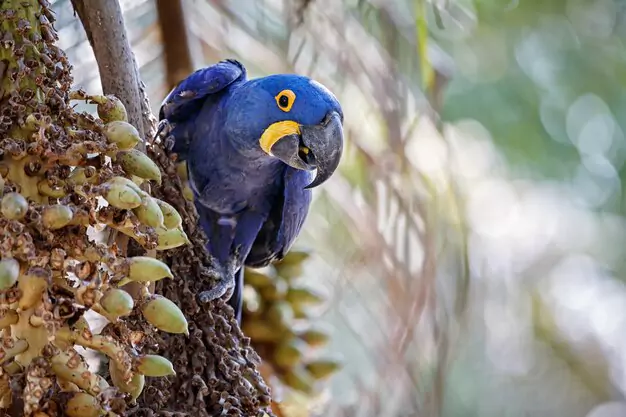
The expense of owning a blue macaw goes beyond the initial purchase price. Additional expenses and upkeep costs, such as food, vet bills, and toys, can add up.
Understanding Ongoing Costs For Housing, Food, And Veterinary Care
Blue macaws are not only stunning and intelligent birds but also require proper care and attention to thrive in captivity. When considering the cost of owning a blue macaw, it’s essential to factor in the ongoing expenses for housing, food, and veterinary care.
Here’s a breakdown of what you can expect:
Housing:
- Blue macaws require spacious and secure enclosures to ensure their well-being. A quality macaw cage can cost anywhere from $500 to $2,500.
- Proper cage accessories like perches, toys, and enrichment items are essential for a blue macaw’s mental and physical health. You can allocate an additional $100 to $500 for these items.
Food:
- Blue macaws have a diverse diet consisting of fruits, vegetables, nuts, seeds, and specially formulated macaw pellets. On average, you can expect to spend around $50 to $100 per month on food.
- Providing fresh produce and occasional treats is necessary to meet their nutritional needs and keep them happy.
Veterinary Care:
- Regular veterinary check-ups are crucial to ensure your blue macaw’s overall health. A yearly vet visit can cost anywhere from $100 to $300, depending on the location and specific services required.
- Vaccinations, parasite prevention, and blood tests may be necessary expenses that can range from $50 to $200 annually.
- In the unfortunate event of illness or injury, emergency veterinary care for a blue macaw can be quite costly, with medical bills potentially exceeding $1,000 or more.
Unexpected Costs And Budgeting For Emergencies:
- In addition to the ongoing expenses, it’s essential to budget for unexpected costs and emergencies. Here are some factors to consider:
- Blue macaws are prone to certain health issues, such as feather plucking or beak malformation, which may require special attention or treatment. Budgeting an extra $500 to $1,000 per year for unexpected medical expenses is recommended.
- Accidents can happen, and having an emergency fund set aside is crucial. Consider setting aside a minimum of $1,000 to cover unforeseen situations that may arise.
Remember, owning a blue macaw requires a long-term commitment to their well-being, and the expenses associated with their care should be carefully considered before bringing one into your home. It’s essential to prioritize their health and happiness by providing proper housing, nutrition, and access to veterinary care.
Demand And Seasonal Price Fluctuations
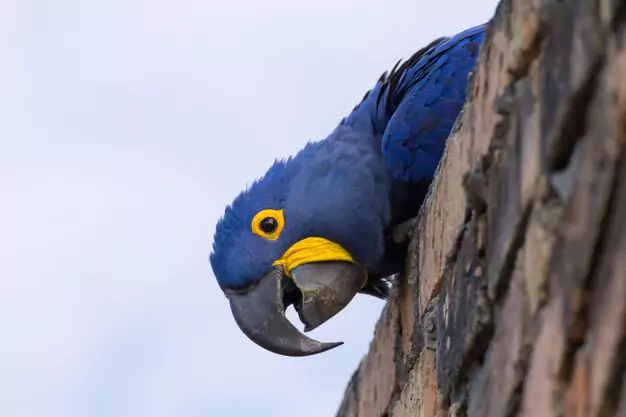
The price of a blue macaw can vary depending on demand and seasonal fluctuations. Buyers should be aware of these factors before making a purchase.
Blue macaws are majestic and vibrant birds that are highly sought after by bird enthusiasts. If you are considering adding one of these beautiful creatures to your collection, you may be wondering how much they cost. The price of a blue macaw can vary depending on various factors, including demand and seasonal fluctuations.
In this section, we will explore these factors in detail to help you understand why blue macaw prices can fluctuate.
Factors That Can Cause Pricing To Fluctuate:
- Rarity: Blue macaws are not very common, and some species, like the hyacinth macaw, are considered endangered. This rarity can drive up the demand and ultimately the price of these birds.
- Breeding success: Breeding blue macaws in captivity can be challenging and time-consuming. Factors such as breeding success rates and the availability of hand-raised blue macaw chicks can influence their price.
- Age and maturity: Older blue macaws that have reached maturity and can breed tend to be more valuable compared to younger birds. The age and breeding potential of a blue macaw can impact its price.
- Genetic characteristics: Blue macaws with desirable genetic characteristics, such as vibrant plumage coloration or unique markings, can command higher prices due to their rarity and aesthetic appeal.
Timing Considerations For Optimal Pricing:
- Breeding season: Blue macaws typically breed during specific seasons. The availability of blue macaw chicks may be higher during these seasons, leading to potentially lower prices due to increased supply.
- Holidays and special occasions: Demand for blue macaws may spike during holidays or special occasions when people are looking to buy unique and memorable gifts. Consequently, prices may increase during these times.
- Breeder reputation: Well-established breeders with a good track record may have higher demand for their blue macaws, which can result in higher prices. Reputation can play a significant role in the overall pricing strategy of breeders.
Understanding the factors that can cause blue macaw prices to fluctuate is essential when considering purchasing one of these magnificent birds. It is essential to conduct thorough research and consult reputable breeders to ensure you are getting a fair price for the blue macaw of your dreams.
Happy bird hunting!
The Emotional And Social Benefits Of Owning A Blue Macaw
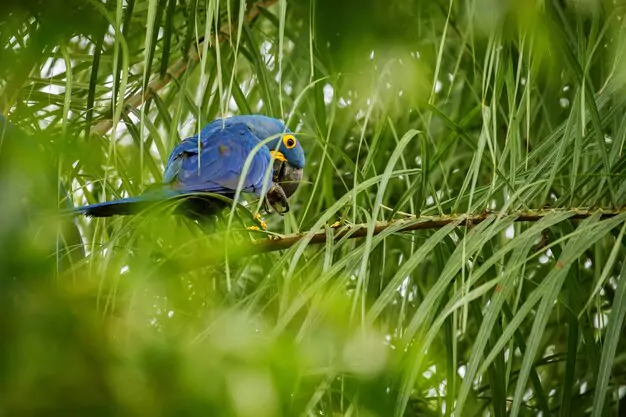
Owning a blue macaw can provide emotional and social benefits, as these vibrant birds are known for their intelligence and ability to form strong bonds with their owners. However, the cost of a blue macaw can vary depending on factors such as age, breeding, and location.
Bonding And Companionship With A Blue Macaw
Blue macaws are highly known for their social nature and their ability to form strong bonds with their owners. Here are some ways in which owning a blue macaw can bring about a sense of bonding and companionship:
- Loyalty like no other: These magnificent birds have a natural inclination to develop strong bonds with their owners. They are known to be loyal and loving companions who will always be by your side.
- Intelligent and interactive: Blue macaws possess high levels of intelligence, which enables them to engage actively with their owners. Their ability to mimic human speech and understand commands allows for meaningful interactions and a deeper connection.
- Playful and affectionate: Blue macaws are known for their playful and affectionate nature. They love spending time with their owners, whether it’s playing games, snuggling up for a cuddle, or simply being in their presence.
- Emotional support: Blue macaws can offer emotional support to their owners, especially in times of stress or loneliness. Their vibrant personalities and unconditional love can uplift spirits and provide comfort during difficult times.
Positive Effects On Mental Well-Being
Owning a blue macaw can have several positive effects on mental well-being. Here are some ways in which these beautiful birds can contribute to a healthier mind:
- Reduced stress and anxiety: Interacting with a blue macaw can help to decrease stress levels and alleviate anxiety. Their playful antics and soothing presence can provide a calming effect, promoting relaxation and well-being.
- Enhanced mood: The vibrant colors and joyful demeanor of a blue macaw can instantly brighten one’s mood. Their contagious enthusiasm and cheerful nature create an uplifting environment, fostering positive emotions.
- Sense of purpose and responsibility: Taking care of a blue macaw requires consistent attention and care. This responsibility can provide a sense of purpose, offering a daily routine and a reason to prioritize self-care.
- Increased social interaction: Blue macaws are known to be social birds, and their presence can encourage social interaction. Whether it’s sharing stories about your avian companion or connecting with other bird enthusiasts, owning a blue macaw can facilitate social connections.
- Cognitive stimulation: Interacting with and training a blue macaw can provide cognitive stimulation for both the bird and the owner. Engaging in activities that challenge and stimulate the mind promotes mental agility and can enhance cognitive abilities.
Owning a blue macaw can bring companionship, emotional support, and positive effects on mental well-being. These remarkable birds can forge deep bonds and contribute to a happier and healthier life.
Conservation Efforts And Supporting The Blue Macaw Population
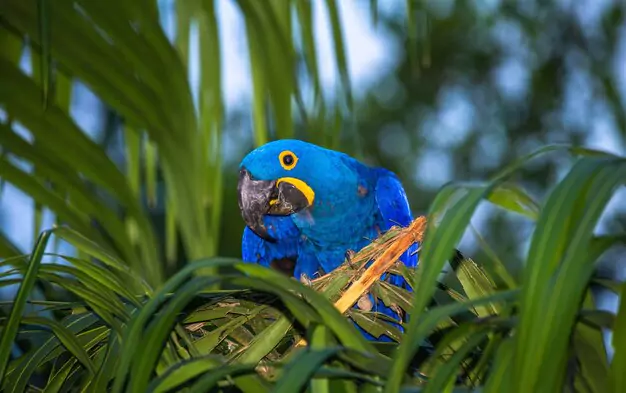
Blue macaws are critically endangered and their population is rapidly declining. Supportive conservation efforts play a vital role in protecting these beautiful birds from extinction. By contributing to these initiatives, we can ensure a brighter future for the blue macaw population.
How Owning A Blue Macaw Contributes To Conservation:
Owning a blue macaw not only brings joy and companionship but also plays a vital role in supporting conservation efforts and protecting the blue macaw population. Responsible ownership and promoting sustainability are key factors that contribute to the overall preservation of these beautiful birds.
Here are some ways in which owning a blue macaw can help in conservation efforts:
- Awareness and education: By owning a blue macaw, you become an ambassador for their conservation. You can spread awareness about the threats they face and the importance of their protection. Educating others about their natural habitat, behavior, and conservation efforts helps build a community dedicated to their preservation.
- Funding conservation initiatives: The proceeds from the sale of blue macaws often go directly into conservation initiatives. These funds support research, breeding programs, habitat restoration, and anti-poaching efforts. By contributing financially, owners play a significant role in ensuring the survival of the species.
- Participation in breeding programs: Owning a blue macaw can provide opportunities to participate in breeding programs. These programs aim to increase the population and genetic diversity of the blue macaw. By becoming a part of such programs, owners contribute directly to the long-term survival and growth of the population.
- Promoting sustainable practices: Responsible ownership involves promoting sustainable practices in the pet trade industry. By supporting breeders and sellers who prioritize ethical practices, you encourage a more sustainable supply chain that prioritizes the welfare of the birds and their natural habitats.
- Supporting conservation organizations: Owners of blue macaws can support various conservation organizations dedicated to protecting the species and its habitat. Donating to reputable organizations and actively participating in their initiatives allows you to contribute to larger-scale conservation efforts that go beyond your ownership.
Owning a blue macaw provides a unique opportunity to actively engage in conservation efforts and support the overall well-being of these magnificent birds. By raising awareness, funding initiatives, participating in breeding programs, promoting sustainability, and supporting conservation organizations, owners play a vital role in securing a future for the blue macaw population.
Remember, responsible ownership and a commitment to conservation go hand in hand. By taking these steps, you can make a meaningful impact and ensure that the blue macaw thrives for generations to come.
Frequently Asked Questions For How Much Does a Blue Macaw Cost
How Much Does A Blue Parrot Macaw Cost?
The cost of a blue parrot macaw can vary, but on average, they range between $1,000 and $5,000.
How Much Is A Purple Macaw?
A purple macaw typically costs around $1,500 to $2,500. It is a beautiful and colorful bird that stands out with its vibrant purple feathers. The price may vary depending on factors such as age, breed, and availability. Purple macaws are known for their intelligence and social nature, making them popular pets among bird enthusiasts.
They require a spacious and stimulating environment to thrive and need proper care and attention. Before purchasing a purple macaw, it’s important to research and understand their specific needs, including diet, exercise, and mental stimulation. It is also recommended to buy from a reputable breeder or adopt from a rescue center to ensure the bird’s well-being and support conservation efforts.
Owning a purple macaw can be a rewarding and lifelong commitment.
How Long Do Blue Macaws Live For?
Blue macaws have a lifespan of around 30 to 40 years in their natural habitat. However, some well-cared-for blue macaws can live for up to 50 years. These majestic birds can thrive if they receive proper nutrition and care. It’s important to provide them with a balanced diet and a spacious environment that allows them to fly and exercise.
Regular veterinary check-ups are essential to ensure their health and well-being. A well-maintained habitat and a stress-free environment also contribute to their longevity. By taking appropriate measures, blue macaws can live a healthy and fulfilling life for several decades.
Are Blue Macaws Good Pets?
Blue macaws can make good pets as they are intelligent, social, and charismatic birds. They have vibrant blue feathers, which make them visually stunning. Blue macaws can mimic sounds and learn tricks, which can make them entertaining companions.
However, owning a blue macaw requires commitment, as they have long lifespans and need a lot of attention and mental stimulation. They also require a spacious cage, regular social interaction, and a balanced diet to maintain their well-being. Prior experience with bird ownership is beneficial, as these birds can be loud and demanding.
It’s important to research and understand their specific needs before considering a blue macaw as a pet. Always ensure that they are obtained from reputable breeders or adoption centers to support responsible pet ownership.
Conclusion
To sum up, the price of a blue macaw can vary depending on several factors such as breed, age, and availability. These beautiful birds are renowned for their vibrant blue feathers and unique personality, making them a sought-after exotic pet.
While their initial cost may be high, it is important to consider the long-term expenses associated with owning a blue macaw, including their specialized diet, proper enclosure, and vet care. Additionally, it is crucial to purchase these birds from reputable breeders or adoption centers to ensure their well-being and avoid supporting illegal wildlife trade.
Remember, owning a blue macaw is not just a financial commitment but also a responsibility to provide a suitable environment and care for these fascinating creatures. So, before making a decision, thoroughly research and understand the costs involved to ensure a happy and healthy life for your feathered friend.
